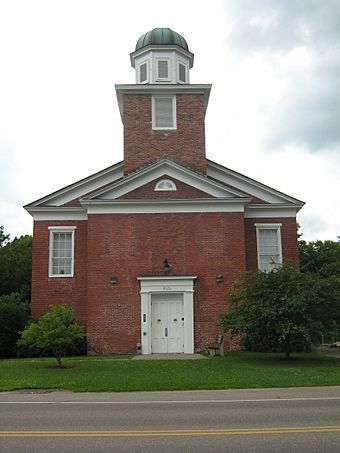Cambridge Meetinghouse facts for kids
Quick facts for kids |
|
|
Cambridge Meetinghouse
|
|

Front of the meetinghouse
|
|
| Location | 85 Church St., Jeffersonville, Vermont |
|---|---|
| Area | less than one acre |
| Built | 1826 |
| Architectural style | Colonial Revival, Federal |
| NRHP reference No. | 81000077 |
| Added to NRHP | February 6, 1981 |
The Cambridge Meetinghouse, often called the Old Brick Church, is a special old building located at 85 Church Street in Jeffersonville, a village in Cambridge, Vermont. It was built way back in 1826. At first, it was a church shared by different religious groups. Later, in 1866, it became the town hall, where important town meetings were held. This continued until 1958. The building was recognized as a historic place in 1981 when it was added to the National Register of Historic Places. Today, it is home to the local post office.
Contents
What the Meetinghouse Looks Like
The Cambridge Meetinghouse is right in the middle of Jeffersonville village. It stands on the south side of Church Street, which is also Vermont Route 108. Next to it is the Smugglers Notch Inn.
Building Design and Features
This building has two stories and is made of brick. It has a roof that slopes down on two sides, called a gabled roof. The front of the building has a triangular shape at the top, known as a pedimented gable. There's also a wide section that sticks out in the middle, which also has a pedimented gable. This is where the main entrance is located.
The entrance itself is set back a little. It has decorative columns on the sides and a fancy frame above it. On the second floor, there are windows on each side of the part that sticks out. Above the main roof and the sticking-out section, there's a square tower. On top of the tower, there's an eight-sided belfry (where bells might be) and a small dome called a cupola.
History of the Old Brick Church
The Cambridge Meetinghouse was built in 1826. It's a great example of the Federal style of architecture, which was popular in the United States during the early 1800s.
From Church to Town Hall
When it was first built, the meetinghouse was meant to be shared by four different Christian groups. Over time, fewer people used the building for church services. In 1866, the town of Cambridge started using the building for its official town meetings. This meant the building became the town hall.
The last church services held in this building were in 1889. The church group that used it then, the Congregationalists, moved to a new building nearby. The Old Brick Church continued to serve as the town hall, with offices in the lower part of the building, until 1958.
Later Changes and Uses
In the early 1900s, a new section was added to the back of the building. This addition was made to create a stage, so the meetinghouse could be used for plays and other performances. Today, this historic building continues to be an important part of the community as the local post office.
See Also
 | Claudette Colvin |
 | Myrlie Evers-Williams |
 | Alberta Odell Jones |



